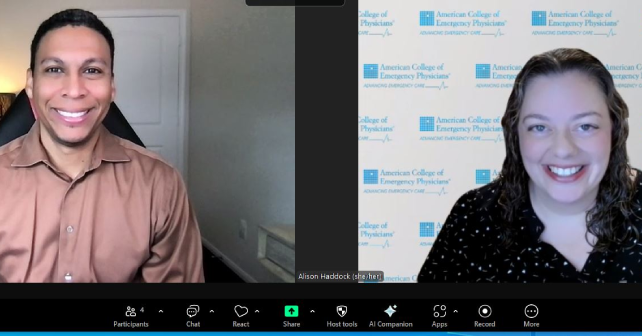
Dr. Dark: One of the difficulties with membership is this concept called the “tragedy of the commons” where people benefit from things ACEP members are paying for, even if they haven’t paid for it themselves. How do you counter that mentality of people who want to stay outside of the organization because they feel like they’ll get those benefits anyway, as opposed to people that want to stay dedicated and continue to contribute to the organization?
Explore This Issue
ACEP Now: Vol 43 – No 12 – December 2024Dr. Haddock: I ask them to join and be part of the solution, not just let the solution happen to them. There are tons of ways to have your voice heard within ACEP as well. You can participate on a committee, you can participate in a section, you can become a Councillor. There are ways that you can not only sit back and watch those good things happen, but you can participate in implementing them and prioritizing them.
Dr. Dark: We’re recording this the Friday after the presidential election, and our country right now seems divided. I’ve seen a lot of the opinions put forth by ACEP members on multiple issues, whether it’s reproductive health care, diversity, equity, inclusion, or other broader societal issues. Those opinions seem to differ drastically. We receive letters to the editor, we get opinions, and sometimes they represent various poles. How do you, as ACEP President, plan to navigate these issues that pit some members of the College in opposite camps from one another?
Dr. Haddock: These are challenging spaces for us to be in, but I think we need to focus on putting our patients and our practices first. There can be a variety of opinions on an issue, and maybe it doesn’t really touch us in emergency medicine. We need to look at the spaces where it does engage us as emergency physicians and how we can make sure that physicians are protected, making sure they have the resources that they need to provide quality care. For example, Medicaid expansion can be a somewhat politically polarizing issue. However, when you look at reimbursement for emergency physicians, it’s generally expected to improve with Medicaid expansion, so we offer resources to states and we have a policy in support of Medicaid expansion because that seems to get better compensation for our emergency physicians and offer better coverage for our patients.
Dr. Dark: Thank you, Dr. Haddock.




No Responses to “A Conversation with ACEP President Dr. Alison Haddock”